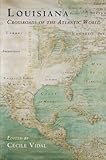Louisiana : Crossroads of the Atlantic World / ed. by Cécile Vidal.
Material type: TextSeries: Early American StudiesPublisher: Philadelphia : University of Pennsylvania Press, [2013]Copyright date: ©2014Description: 1 online resource (304 p.) : 3 illusContent type:
TextSeries: Early American StudiesPublisher: Philadelphia : University of Pennsylvania Press, [2013]Copyright date: ©2014Description: 1 online resource (304 p.) : 3 illusContent type: - 9780812245516
- 9780812208733
- 976.3 23
- F372 .L68 2014eb
- online - DeGruyter
- Issued also in print.
| Item type | Current library | Call number | URL | Status | Notes | Barcode | |
|---|---|---|---|---|---|---|---|
 eBook
eBook
|
Biblioteca "Angelicum" Pont. Univ. S.Tommaso d'Aquino Nuvola online | online - DeGruyter (Browse shelf(Opens below)) | Online access | Not for loan (Accesso limitato) | Accesso per gli utenti autorizzati / Access for authorized users | (dgr)9780812208733 |
Frontmatter -- Contents -- Introduction. Louisiana in Atlantic Perspective -- Part I. Empires -- Chapter 1. "To Establish One Law and Definite Rules": Race, Religion, and the Transatlantic Origins of the Louisiana Code Noir -- Chapter 2. Making a Career out of the Atlantic: Louisiana's Plume -- Chapter 3. Spanish Louisiana in Atlantic Contexts: Nexus of Imperial Transactions and International Relations -- Part II. Circulations -- Chapter 4. Slaves and Poor Whites' Informal Economies in an Atlantic Context -- Chapter 5. "Un Nègre nommè [sic] Lubin ne connaissant pas Sa Nation": The Small World of Louisiana Slavery -- Part III. Intimacies -- Chapter 6. Caribbean Louisiana: Church, Métissage, and the Language of Race in the Mississippi Colony during the French Period -- Chapter 7. Private Lives and Public Orders: Regulating Sex, Marriage, and Legitimacy in Spanish Colonial Louisiana -- Chapter 8. Atlantic Alliances: Marriage among People of African Descent in New Orleans -- Conclusion. Beyond Borders: Revising Atlantic History -- Notes -- Contributors -- Index -- Acknowledgments
restricted access online access with authorization star
http://purl.org/coar/access_right/c_16ec
Located at the junction of North America and the Caribbean, the vast territory of colonial Louisiana provides a paradigmatic case study for an Atlantic studies approach. One of the largest North American colonies and one of the last to be founded, Louisiana was governed by a succession of sovereignties, with parts ruled at various times by France, Spain, Britain, and finally the United States. But just as these shifting imperial connections shaped the territory's culture, Louisiana's peculiar geography and history also yielded a distinctive colonization pattern that reflected a synthesis of continent and island societies.Louisiana: Crossroads of the Atlantic World offers an exceptional collaboration among American, Canadian, and European historians who explore colonial and antebellum Louisiana's relations with the rest of the Atlantic world. Studying the legacy of each period of Louisiana history over the longue durée, the essays create a larger picture of the ways early settlements influenced Louisiana society and how the changes in sovereignty and other circulations gave rise to a multiethnic society. Contributors examine the workings of empire through the examples of slave laws, administrative careers or on-the-ground political negotiations, cultural exchanges among landowners, slave holders, and slaves, and the construction of race through sexuality, marriage, and household formation. As a whole, the volume makes the compelling argument that one cannot write Louisiana history without adopting an Atlantic perspective, or Atlantic history without referring to Louisiana.Contributors: Guillaume Aubert, Emily Clark, Alexandre Dubé, Sylvia R. Frey, Sylvia L. Hilton, Jean-Pierre Le Glaunec, Cécile Vidal, Sophie White, Mary Williams.
Issued also in print.
Mode of access: Internet via World Wide Web.
In English.
Description based on online resource; title from PDF title page (publisher's Web site, viewed 30. Aug 2021)


